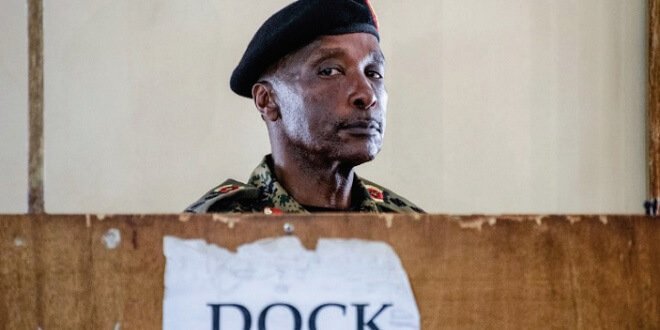
Kampala, Uganda | THE INDEPENDENT | The Constitutional Court has dismissed a petition questioning the charges made against Inspector General of Police Edward Kale Kayihura and seven other police officers in a 2016 case.
The charges were dropped by Director of Public Prosecutions soon after, but lawyer Robert Rutaro is nevertheless questioning why “torture” was among the cases cited in court.
Rutaro argued that prosecuting senior police officers with torture without specifying the acts violated the right to a fair hearing and was inconsistent with the Constitution. He also argued that the decision to charge officers under different charges based on the same facts amounted to double jeopardy and was unconstitutional.
However, the Attorney General through Commissioner Phillip Mwaka and State Attorneys Nathan Hillary Ebila and Twinomugisha Mugisha asked the court to dismiss the petition on grounds that the submissions by Rutaro were frivolous and misconceived. He said the Prevention and Prohibition of Torture Act covers offenses of torture and not civil wrongs. According to the Attorney General, criminal offenses by their nature attract individual responsibility.
The attorney general also argued that Court has the duty to distinguish acts of policing during the dispersal of a riotous crowd under the Police Act from acts of torture stipulated under the Prevention and Prohibition of Torture Act.
They added that the submissions by Rutaro are irrelevant since the charges were withdrawn by the DPP after taking over the case.
In a unanimous verdict, a panel of five Constitutional Court Justices comprising Fredrick Egonda Ntende, Elizabeth Musoke, Christopher Madrama, Monica Mugenyi, and Christopher Gashirabake, dismissed the petition filed by lawyer Rutaro, who argued that the officers shouldn’t have been charged due to their status as agents of the state performing state duties.
Verdict
The Constitutional Court in Kampala delivered a unanimous verdict upholding the charges of torture. The charges date back seven years when the suspects were accused of violating the rights of Dr. Kizza Besigye’s supporters.
The others are Andrew Kaggwa, the former Kampala South Regional Police commander, James Ruhweza, the former Head of Operations, Kampala Metropolitan Police, Samuel Bamuziibire, the former Kampala Metropolitan Field Force Unit commander, Patrick Muhumuza, the former Operations Commander Field Force Unit, Kampala Metropolitan South, Wesley Nganizi, the former Kampala North Regional police commander, Geoffrey Kaheebwa, the former Kampala South Deputy Regional Police Commander and Moses Nanoka, the former Wandegeya Division police commander.
The accused officers were alleged to have committed acts of torture against Joseph Kaddu, Andrew Ssebitosi, Rogers Ddiba, Boda Boda riders, and Dr. Kizza Besigye’s supporters in 2016. The Makindye Chief Magistrates Court issued criminal summons against the suspects in July 2016.
However, Rutaro argued that prosecuting senior police officers with torture without specifying the acts violated the right to a fair hearing and was inconsistent with the Constitution. He also argued that the decision to charge officers under different charges based on the same facts amounted to double jeopardy and was unconstitutional.
The Constitutional Court agreed with the government’s lawyers that criminal liability is personal, and police officers must be held accountable for their actions, including acts of torture.
“Furthermore, there is no constitutional immunity granted to such officers. The Prevention and Prohibition of Torture Act puts in place provisions to implement a constitutional order against torture, cruel inhuman, and degrading treatment.
“The government has no official policy in support of torture, and that torture is saved for exceptional circumstances, unnecessary for the efficient exercise of public duties, and also that torture causes immense suffering and is unconscionable,” ruled the Justices. Despite Rutaro’s argument that certain laws cannot be applied retrospectively, the court ruled that the accused officers were properly charged under the existing law.
“According to the charge sheet in Annexure D, the activities complained of happened on the 13th of July 2016. The Prevention and Prohibition of Torture Act commenced on the 18th of September 2012. It is, therefore, my finding that the accused persons were properly charged under existing law,” reads the judgment. Precious Nahabwe, one of the lawyers from Elgon and Company Advocates that represented Rutaro, said they would file an application to allow them to appeal the decision because they were not duly informed, thereby preventing them from lodging their appeal in time.
*****
URN
 The Independent Uganda: You get the Truth we Pay the Price
The Independent Uganda: You get the Truth we Pay the Price





